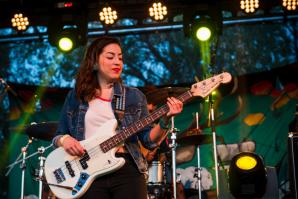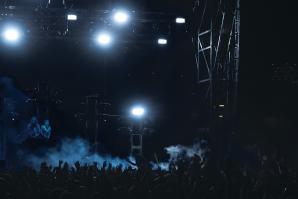A few weeks ago, Eventbrite posted a blog entitled 5 Unexpected Cities Experiencing A Music Renaissance, which is essentially a press release documenting the company’s ascension as the leading digital ticketing service. Sacramento tops the list at a growth rate of 177 percent, whereas Los Angeles achieved a mere 41 percent, between 2015 and 2016.
This recognition, while not a reflection of independently-researched data and only accounting for tickets passing through Eventbrite, no doubt made City Hall happy. But this “news” from Eventbrite doesn’t tell the whole story.
Founded in San Francisco in 2006, Eventbrite services make promotion streamlined for 2.5 percent of the ticket price plus $.99 per ticket sold. According to a 2016 article in Fortune, Eventbrite has processed over $5 billion in gross tickets sales since its launch.
What does not figure into Eventbrite’s blog is that the three biggest music venues in Sacramento — not named Golden 1 Center — use Eventbrite exclusively. It’s the preferred service of Goldfield Trading Post, Harlow’s and Ace of Spades in Sacramento. Formerly, the Boardwalk in Orangevale used the service, but ended its partnership with Eventbrite in 2016.
Know what will rarely be found at those venues? Local performers. Ace of Spades exclusively features touring acts. Harlow’s gives local performers opening slots when the tour calls for it, like the recent Geographer show with openers Doombird and So Much Light. The same will apply at Holy Diver, a new all-ages venue opening in October. Meanwhile, Goldfield will host local post-hardcore band Slaves on their The Beautiful Death tour, but otherwise the acts are mainly big names from outside the area.
These Eventbrite venues might not create a rising-tide-lifts-all-ships scenario in the Sacramento scene, but the abundance of non-local performers gives locals less reason to drive to the Bay Area for a good show. Ace of Spades’ upcoming calendar of the Jesus and Mary Chain, George Clinton and Parliament Funkadelic, and Third Eye Blind is a benefit to locals that would rather see nationally-touring bands as opposed to local ones.
But proclamations of a renaissance and the fastest-growing live music scene sting given the recent closure of Starlite Lounge (soon-to-become Holy Diver), the cancellation of live music at Naked Lounge and the near closure of Red Museum. In fact, it took the City of Sacramento stepping in to get electrical repairs donated in order for the DIY space to remain open. Major tours at 500-capacity venues come with lines around the block, meanwhile 200-capacity rooms and smaller are under duress.
Related: Event app finds niche in helping connect local communities
Shouldn’t a renaissance imply a cultural shift, a widespread intensifying of individual human potential that incorporates the musicians that actually live in that particular place? To call this 177 percent boon a “renaissance” is to the benefit of a few venues, the touring acts booked there and, of course, Eventbrite.
Which Ticketing Service to Use?
The shift among some venues to Eventbrite is recent, hence the meteoric rise on the company’s chart. Eric Rushing, CEO of the Sacramento-based Artery Foundation, says Ace of Spades started using Eventbrite before his company sold the venue to Live Nation — and after turning down Eventbrite’s original offer of service and choosing to stick by Queue, a locally-designed event software founded by Greg Patterson.
“Queue was beta tested through Ace of Spades,” Rushing says. “We used their ticketing for our company and it worked for the first four years before we did that deal.” The deal refers to Eventbrite acquiring Queue in 2016 for an undisclosed amount. Patterson now serves as director of music and live events at Eventbrite.
Related: Live Nation Acquires Ace Of Spades
Gabriell Garcia, owner and operator of Blue Lamp in Sacramento, says she considered using Queue at one point, but has not been approached by Eventbrite. She describes her pre-sale ticketing, which is done through the venue website, as DIY. Even when Blue Lamp offers hardcopy tickets, the printing is handled without corporate assistance. Unlike Eventbrite, Blue Lamp has only a one-time service fee of $1.50, no matter how many tickets are purchased.
Rushing’s venues — Goldfield and Ace of Spades (where he is now a Live Nation employee) — continue to be powered by Eventbrite. At the end of 2016, Rushing and his business partner Brett Bair turned the Boardwalk, which they had owned, back over to original owner Mark Earl who now uses a different ticketing service. Rushing and Bair’s newest music venue, the all-ages Holy Diver on 21st Street, also uses Eventbrite.
Harlow’s on J Street in Sacramento uses Ticketfly, which was successfully purchased by Eventbrite from Pandora for the price tag of $200 million in June of this year.
Really a Renaissance?
After four years of owning Blue Lamp, Garcia describes the Sacramento live music scene as “consistently inconsistent.” She noted there’s been growth, but offered a hard no to the notion there’s a renaissance.
“We’re a C market, B market at best,” she says. “When we took over four years ago, we had bands telling us they skip Sacramento and play Redding.”
Sure, Sacramento has some notable exports in Cake, Deftones and Death Grips. But keep in mind, the last time any of these bands played Sacramento it was 2015 at three different festivals. None of them can be counted as part of today’s local scene. As reported in the local media, ex-Sacramento bands like Chelsea Wolfe and Trash Talk reluctantly return or opt out entirely knowing that a dedicated few will buy tickets for the Bay Area show.
Although, some prominent members of the local music scene agree with the claim of a renaissance. Rushing, for instance, disputes that Sacramento is simply skipped over because no one wants to come here. “That is not true. I’d say maybe two out of 10 shows now maybe skip the market,” he says. “There’s also two out of 10 that don’t even go to San Francisco now. That’s how much Sacramento has changed the market. We’re routed in on almost every single major tour. Whether we get it or not doesn’t necessarily mean they didn’t want to play here.”
Garcia echoes Rushing’s point that tours are bypassing the Bay Area for Sacramento as positive change, adding that, “I’ve seen some growth in the market, but mostly from DIY, independent venues. The more successful everyone is being, the more successful we will all be. We’ve worked hard to build our reputation.”
Also staggering in Eventbrite’s post is the graphic showing the average ticket price in Sacramento is $30. Considering there are bands who’ve been performing in this city for decades that cannot get their own friends to pay more than $8, this “boon” is fool’s gold for the greater community.
Recommended For You

First Festival Looks Toward Growth
Homegrown music festival applies for City of Sacramento Creative Economy grant
While many supporters of local music may agree that Sacramento needs a homegrown music festival, this type of event isn’t easy to produce, and doesn’t always get the financial backing it needs.

The Little Music Festival That Was
What happened to TBD Fest — and what happens next?
After losing an undisclosed sum both years, TBD Fest (otherwise known as The Bridge District Festival) has incurred blame from investors and rival music promoters for being underfunded. General consensus is that if a festival can’t pay for its talent before selling a single ticket, it’s under-capitalized.



